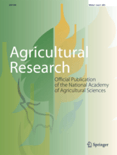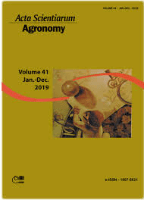
Revista Brasileira de Ciencias Agrarias-Agraria
Scope & Guideline
Connecting researchers to cultivate a thriving agricultural community.
Introduction
Aims and Scopes
- Agricultural Production and Management:
Research in this area emphasizes improving crop yields and management strategies, including studies on fertilization, irrigation, and pest control to enhance agricultural productivity. - Plant Physiology and Genetics:
This scope includes investigations into the physiological responses of plants to environmental stresses, genetic diversity studies, and the development of resilient crop varieties. - Soil Science and Fertility:
Studies focused on soil characteristics, fertility management, and the impact of agricultural practices on soil health are crucial for sustainable agriculture. - Ecological and Environmental Impact:
Research assessing the ecological implications of agricultural practices, including biodiversity conservation and the effects of climate change on agriculture. - Innovative Agricultural Technologies:
Focus on the integration of technology in agriculture, including the use of biostimulants, precision agriculture, and automation to enhance farming efficiency.
Trending and Emerging
- Sustainable Agricultural Practices:
An increased focus on sustainable practices, including organic farming, agroforestry, and regenerative agriculture, highlights the journal's commitment to ecological balance. - Technological Innovations in Agriculture:
The integration of technology, such as IoT-based monitoring systems and machine learning applications in agriculture, demonstrates a trend towards precision agriculture and data-driven practices. - Climate Change Adaptation Strategies:
Research addressing the impacts of climate change on agriculture, including studies on crop resilience and adaptive management practices, is gaining traction. - Biological and Organic Amendments:
There is a notable increase in studies exploring the use of biostimulants, biofertilizers, and other organic amendments to enhance soil health and crop performance. - Water Management and Irrigation Efficiency:
Research focusing on efficient water use, including studies on drip irrigation and the management of saline water, is becoming increasingly relevant in the context of water scarcity.
Declining or Waning
- Traditional Pest Management Techniques:
Research centered on conventional pest control methods has seen a decline, as there is a growing preference for integrated pest management and biological control strategies. - Chemical Fertilization Studies:
While still relevant, the frequency of studies solely focused on chemical fertilizers has decreased, likely due to an increasing emphasis on organic and sustainable practices. - Single Crop Studies:
Research focusing on single crop systems is waning in favor of studies exploring intercropping, polyculture, and agroecological practices that promote biodiversity.
Similar Journals

PAKISTAN JOURNAL OF AGRICULTURAL SCIENCES
Exploring Agricultural Frontiers for a Sustainable FutureWelcome to the Pakistan Journal of Agricultural Sciences, a prominent platform for disseminating vital research findings in the fields of agronomy, crop science, food science, plant science, and soil science. Published by the prestigious University of Agriculture in Faisalabad, this journal aims to enhance the scientific discourse surrounding agricultural innovation and sustainability in Pakistan and beyond. With an ISSN of 0552-9034 and E-ISSN of 2076-0906, the journal serves as a valuable resource for researchers, professionals, and students interested in cutting-edge agricultural developments. As of 2023, the journal is ranked in the Q3 category for Agronomy and Crop Science as well as Food Science and positioned in Q4 for Plant and Soil Science, highlighting its growing impact within a competitive academic landscape. While the Pakistan Journal of Agricultural Sciences is not currently open access, it provides a comprehensive archive of research converging from 2011 to 2024, ensuring that critical knowledge remains accessible to those striving to advance the agricultural sciences. Join us in our mission to foster innovation and support sustainable practices in agriculture.

International Journal of Plant Production
Empowering global food security with cutting-edge plant science.International Journal of Plant Production, published by SPRINGER in Switzerland, serves as a leading platform for the dissemination of innovative research in the fields of Agronomy, Crop Science, and Plant Science. With an ISSN of 1735-6814 and an E-ISSN of 1735-8043, this journal has maintained its reputation by achieving a Q2 quartile ranking in both categories as of 2023, alongside notable Scopus rankings placing it in the top quartiles of its fields (Rank #105/516 and Rank #88/406, respectively). The journal's scope encompasses a wide array of topics vital to sustainable agriculture and plant production systems, making it a critical resource for researchers, professionals, and students striving for advancements in these disciplines. By fostering open scientific dialogue and supporting cutting-edge research, the International Journal of Plant Production is committed to contributing to the resolution of global food security challenges, enhancing agricultural practices, and promoting ecological sustainability.

BRAGANTIA
Empowering Innovation in Agriculture and BiologyBRAGANTIA, published by the Instituto Agronômico, is a distinguished open access journal that has been a vital resource since its inception in 1977. With an ISSN of 0006-8705 and E-ISSN 1678-4499, this journal is recognized for its contributions to the field of Agricultural and Biological Sciences, where it currently holds a respectable Q2 ranking as of 2023. Additionally, BRAGANTIA is indexed in various databases, supporting its impact within Materials Science (Q3 ranking). Positioned in Brazil, the journal promotes the dissemination of high-quality research, aiming to bridge the gap between academia and practical applications in agricultural innovation and sustainability. Researchers, professionals, and students looking to keep abreast of recent advancements and their implications will find BRAGANTIA to be an indispensable platform for sharing and accessing vital agricultural knowledge.

Journal of Agricultural Science and Technology
Driving Progress in Agricultural and Biological SciencesIntroducing the Journal of Agricultural Science and Technology, a prominent publication dedicated to advancing research in the field of agricultural and biological sciences. Published by TARBIAT MODARES UNIVERSITY in Iran, this journal has been a vital resource since its inception in 2008, fostering the dissemination of critical findings and innovative practices. With an ISSN of 1680-7073, it is indexed in reputable databases, contributing to its Q3 ranking within the agricultural sciences category for 2023, and placing it in the 51st percentile of Scopus rankings for general agricultural and biological sciences. The journal focuses on various interdisciplinary areas, providing a platform for research that impacts agriculture and food production systems worldwide. Although currently not an open-access journal, it aims to bridge knowledge gaps and promote advancements that meet the challenges of modern agriculture. Researchers, professionals, and students alike are encouraged to engage with the high-quality peer-reviewed articles that reflect the latest trends and discoveries in agricultural science.

Romanian Agricultural Research
Advancing Agricultural Science for a Sustainable FutureRomanian Agricultural Research is a prominent academic journal dedicated to advancing the field of agricultural science with a specific focus on agronomy and crop management. Published by the NATL AGRICULTURAL RESEARCH & DEVELOPMENT INST in Romania, this journal has established itself as an important resource within its discipline, evidenced by its Q3 ranking in the Agronomy and Crop Science category for 2023. With its ongoing publication since 2008, the journal provides a platform for researchers and professionals to disseminate their findings and share innovative practices that address the challenges faced in agricultural development. Although it operates under a non-open access model, Romanian Agricultural Research commits to rigorous peer-review processes, ensuring the high-quality content that enhances the academic community’s knowledge base. The journal's objective is to foster dialogues surrounding sustainable agriculture, improve crop yield, and contribute to the enhancement of agricultural practices globally. Researchers, professionals, and students will find this journal to be an invaluable repository of knowledge and a catalyst for future agricultural innovations.

Agrosystems Geosciences & Environment
Fostering interdisciplinary research for a healthier planet.Agrosystems Geosciences & Environment, published by WILEY, is a premier open access journal dedicated to advancing the interdisciplinary field of agricultural and environmental sciences. With an E-ISSN of 2639-6696, the journal has gained recognition since its inception in 2018, currently holding a Q2 ranking in Agricultural and Biological Sciences, Plant Science, and Soil Science. Operating from the United Kingdom, Agrosystems Geosciences & Environment contributes significantly to knowledge generation and dissemination, offering vital insights into sustainable practices, soil management, and crop optimization. Researchers and professionals will find the open access model particularly advantageous, promoting greater visibility and engagement within the scientific community. By bridging the gap between geosciences and agrosystem management, this journal is vital for those committed to addressing today's critical environmental challenges.

AGRICULTURAL RESEARCH
Empowering researchers to tackle contemporary agricultural challenges.AGRICULTURAL RESEARCH is a distinguished academic journal published by SPRINGER INDIA, focusing on the dynamic fields of Agronomy, Crop Science, and Food Science. With an ISSN of 2249-720X and E-ISSN of 2249-7218, this journal has established itself as a valuable resource for researchers, professionals, and students dedicated to advancing agricultural knowledge and practices. The journal is recognized in the 2023 Scopus Rankings, achieving commendable quartile positions, including Q2 in Agronomy and Crop Science and Plant Science, as well as Q3 in Food Science, indicating its influential presence in the academic community. AGRICULTURAL RESEARCH aims to disseminate cutting-edge research findings, innovative methodologies, and comprehensive reviews, fostering collaboration and discussion among scholars in Switzerland and beyond. Through its commitment to scholarly excellence, this journal is pivotal in addressing contemporary challenges in agriculture, ensuring sustainability, and enhancing food security for the future.

ACTA SCIENTIARUM-AGRONOMY
Driving excellence in agronomy for a thriving planet.ACTA SCIENTIARUM-AGRONOMY is a prestigious, peer-reviewed journal published by UNIV ESTADUAL MARINGA, PRO-REITORIA PESQUISA POS-GRADUACAO, focusing on advanced research in the field of agronomy and crop science. Since its inception as an Open Access journal in 2007, it has significantly contributed to disseminating high-quality research, allowing unrestricted access to its content for a global audience. Operating from Brazil, the journal holds a notable Q2 category ranking in Agronomy and Crop Science as of 2023, validating its importance within the academic community. The journal’s Scopus ranking positions it in the 49th percentile among Agricultural and Biological Sciences, indicating a robust foundation for impactful research. With a commitment to innovation and scientific excellence, ACTA SCIENTIARUM-AGRONOMY aims to provide researchers, professionals, and students with vital insights that drive forward our understanding of agriculture and its environmental implications.

Revista Caatinga
Elevating Agricultural Research to New HeightsRevista Caatinga is a premier open-access journal published by Universidade Federal Rural do Semi-Árido (UFERSA), dedicated to the dissemination of significant research within the field of Agricultural and Biological Sciences. Since its inception in 2006, the journal has aimed to bridge the knowledge gap in various aspects of agricultural practices and biological phenomena, making vital contributions to the scientific community. With its publications indexed in Scopus and holding an impressive Q2 categorization in the competitive landscape of agricultural sciences, the journal ranks within the top half of its category (100/221), demonstrating a commitment to quality scholarship. The journal is based in Brazil and covers a wide array of topics relevant to both local and global agricultural challenges. By fostering open access, Revista Caatinga ensures that vital research is available to a broad audience, promoting knowledge sharing and collaboration among researchers, practitioners, and students around the world.

REVISTA DE LA FACULTAD DE CIENCIAS AGRARIAS
Leading the Way in Agricultural Research and Innovation.REVISTA DE LA FACULTAD DE CIENCIAS AGRARIAS is an esteemed academic journal published by UNIV NACIONAL CUYO, FAC CIENCIAS AGRARIAS, located in Chacras de Coria, Mendoza, Argentina. As a pivotal publication in the fields of Agronomy and Plant Science, it has achieved a commendable Q2 ranking in both categories, indicating its relevance and impact within the scientific community. Since its establishment as an Open Access journal in 2007, it has facilitated the dissemination of crucial research, fostering collaboration and innovation among researchers, professionals, and students alike. The journal's converged years from 2008 to 2024 allow it to present contemporary advancements and discussions related to agricultural practices and plant sciences. With a strong commitment to quality and accessibility, REVISTA DE LA FACULTAD DE CIENCIAS AGRARIAS provides a valuable platform for those engaged in the crucial exploration of sustainable agricultural methodologies and plant innovations.